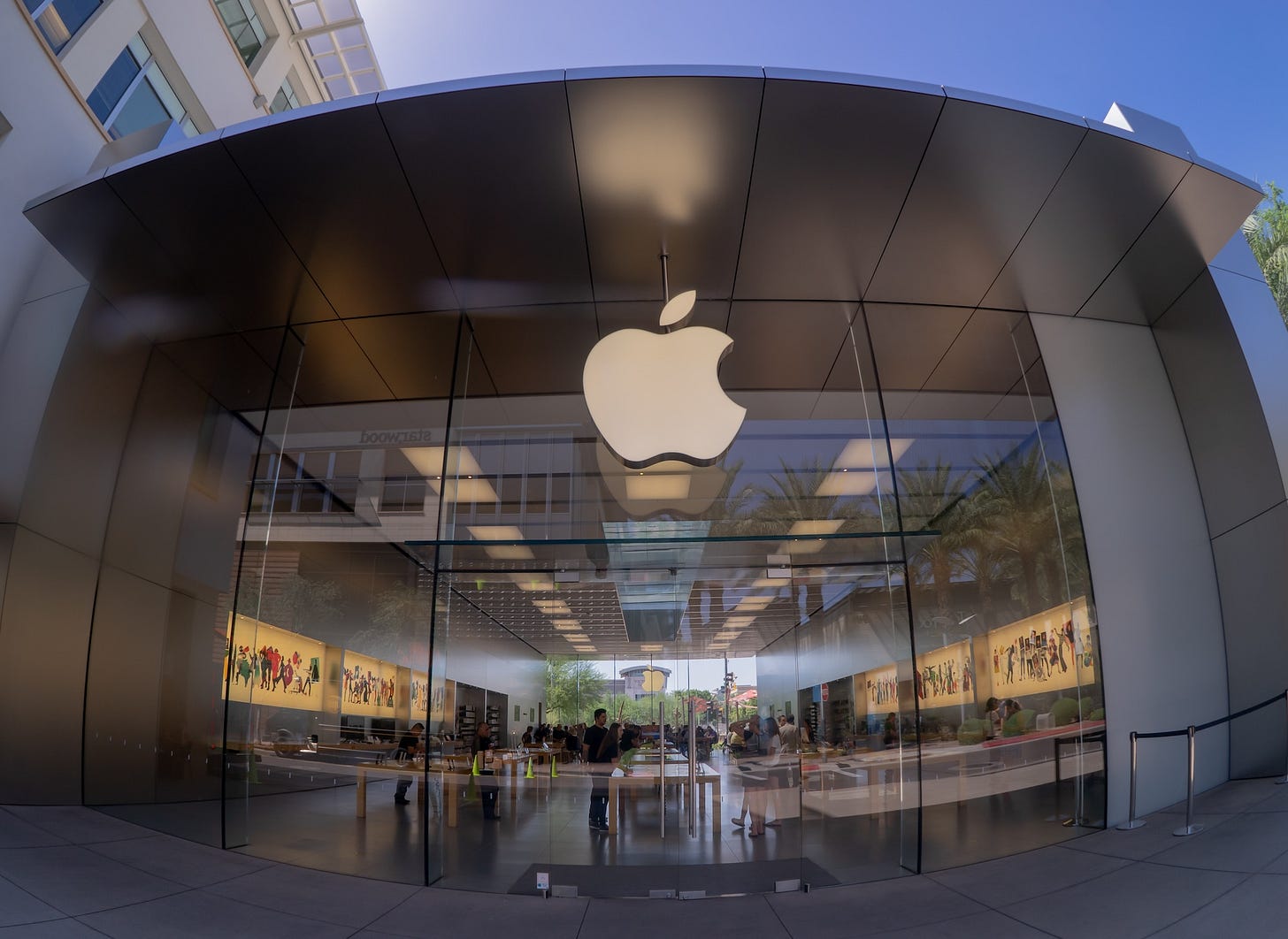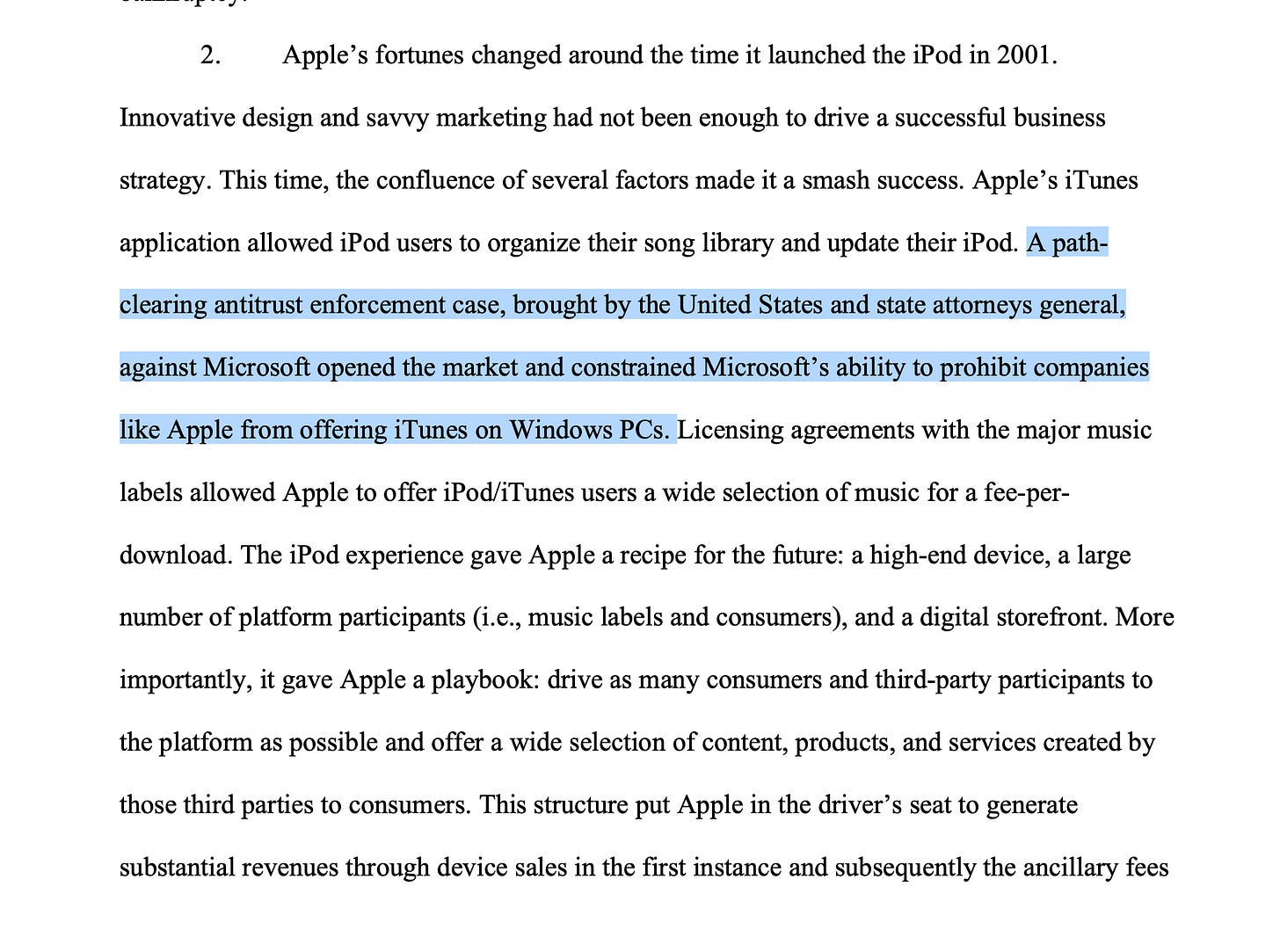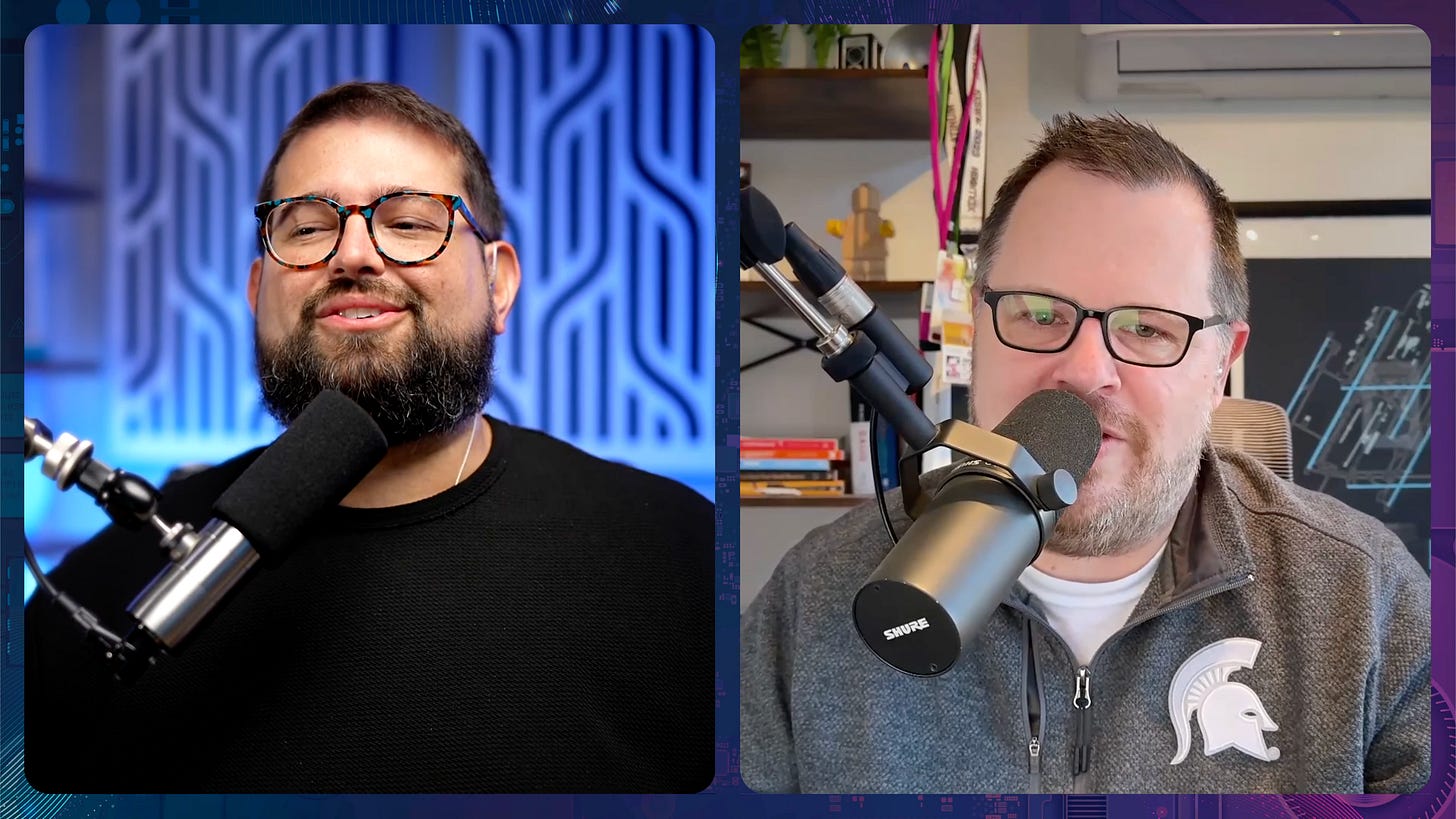US vs Apple isn't about the App Store
It's hard not to think this could have all been avoided had Apple been a little more gracious with developers.
On Thursday, the Department of Justice filed its long-expected anti-trust lawsuit against Apple. The DOJ alleges that Apple has maintained its monopoly over what it calls "performance smartphones," for which it says Apple has 70 percent market share, by limiting the ability for third-party developers to compete. It seems clear that "performance smartphones" is just a thing someone made up, but that's for the lawyers to argue about.
It seems pretty clear, reading through the 88-page complaint, that the DOJ really wanted to make a very different argument than what is on the page. The complaint begins with a very strange telling of the history of the iPod, which, in DOJ's telling, apparently had no chance of success except for the fact the government sued Microsoft which apparently paved the way for the iTunes Store on Windows. That's neither true nor is it relevant. It's just a thing the government likes to tout because it was the last time it won a major antitrust case against a tech company.
I'm guessing the government wanted to make a case about the way Apple manages the App Store, and the fact that it doesn't allow developers to use their own payment methods to avoid paying Apple's commission. The complaint starts with a narrative about how Apple charges a 30 percent commission on app purchases and then charges another 30 percent on in-app transactions.
Here's the relevant part of the complaint:
When developers imagine a new product or service for iPhone consumers, Apple demands up to 30 percent of the price of an app whose content, product, or service it did not create. Then when a consumer wants to buy some additional service within that app, Apple extracts up to another 30 percent, again for a service Apple does not create or develop.
Never mind that almost no app in the App Store monetizes in that way, the case the government is actually bringing isn't about that at all. Instead, it's about five things that have almost nothing to do with the App Store:
Apple prevented the creation of cloud game streaming services.
Apple won't let third-party apps have access to the NFC chip for digital wallet payments.
Apple restricted the ability for developers to create SuperApps.
Apple won't let third-party messaging apps use the API for SMS text messages.
Apple won't let you use a third-party smartwatch and still get Messages.
Aside from the first thing on that list--which Apple has already addressed by allowing game streaming--it's hard to find something on that list that most people care about. Yes, it would be easier to use a third-party smartwatch with your iPhone. And, it makes sense that Apple should allow third-party banking and payment apps to use the NFC chip for contactless payments (it is already doing this in the EU as a result of the DMA). But, does anyone besides Elon Musk care about Super Apps at this point? More importantly, are those really the most important issues the government could find?
Well, no. It's just that a federal judge has already said in its decision in Epic versus Apple, that the iPhone maker is entitled to control over its platform, is entitled to charge a commission to monetize its intellectual property, and the Supreme Court declined to review the case. That means there isn't much the DOJ can challenge in terms of the way it runs the App Store. Congress will have to pass new laws for that to change.
It's a shame, because the complaint does make a few good points. For example, the government points out that Apple uses "privacy and security" as its justification for many things that are mostly about ways the company is able to make more money.
"Apple wraps itself in a cloak of privacy, security, and consumer preferences to justify its anticompetitive conduct," the government says. "Indeed, it spends billions on marketing and branding to promote the self-serving premise that only Apple can safeguard consumers' privacy and security interests... In the end, Apple deploys privacy and security justifications as an elastic shield that can stretch or contract to serve Apple's financial and business interests."
Apple, as you can imagine, disagrees with the lawsuit and says it "threatens who we are and the principles that set Apple products apart in fiercely competitive markets." In its defense, the company says it focuses on "designing products that work seamlessly together, protect people's privacy and security, and create a magical experience for our users."
I think it's fair to say Apple could have avoided all of this had it been willing to give up a small amount of its control over the App Store. Even though this lawsuit isn't really about commissions or App Store review, had Apple been more generous and gracious with developers, there's a reasonable chance it wouldn't now be defending itself in court.
The fact that the case isn't about the App Store, which is arguably the thing that has made Apple the target of so much criticism, shows that even though the government couldn't pursue what it really wanted, it's still motivated to come after Apple. The company that gave the world the single greatest consumer device--and should be one of America's greatest business success stories--is instead a target of the government because it has made more enemies than friends.
Ultimately, that's on Tim Cook as CEO. There's no question he has added incredible value during his time leading Apple. At the same time, it's not hard to see that--as the App Store grew as a business--Cook pushed Apple in a direction where it pursued profit even when it came at a great cost to the company's reputation and goodwill. It's telling that Cook was able to navigate Apple through former President Trump's trade war with China, but can't navigate better relationships with developers.
The strategy of refusing to give an inch until you're forced to move has led Apple to a place where it's just daring lawmakers to do something. For all of his strengths as a leader, it's hard to figure out how Cook has let Apple get to this point. I say that as someone who very much loves my iPhone, and all of the other Apple products I use every day.
Apple--under Cook's leadership--has taken the position that it isn't going to budge until it has to. This lawsuit doesn't seem likely to make much difference--as I said, it'll probably take a change to the law to force the company to loosen its grip. On the other hand, even if Apple wins this case, I imagine that's exactly what will happen.
More about US vs Apple
The Department of Justice comes for Apple (Platformer)
Why the US keeps talking about Microsoft (The Verge)
Apple is making the future worse to protect its business (Wired)
Apple and its smartphone monopoly (Washington Post)
An overview of the government’s case (New York Times)
This Week’s Primary Technology
Be sure to check out this week’s show as Stephen and I touch on the upcoming case (we recorded before it had actually been filed and hadn’t had a chance to read it). Still, we got the basic ideas right. We also talk about Apple’s partnership with Google, and some thoughts about Mr. Beast’s deal with Amazon.
Be sure to follow the show wherever you listen to podcasts: Apple Podcasts / Spotify / PocketCasts / Overcast / primarytech.fm
Mr. Beast’s $100 Million Deal with Amazon
On Tuesday, Jimmy Donaldson, aka Mr. Beast, confirmed that he is making a show for Amazon. The deal, which was previously reported to be worth $100 million, involves what Donaldson calls the biggest game show ever, including 1,000 contestants and a $5 million prize.
Believe it or not, I don't think the money was the main reason Donaldson signed a deal with Amazon MGM Studios. Sure, $100 million is a lot of money, but there are surely other studios that would pay whatever he wanted. If you believe Donaldson, however, it came down to something else that might just be more important.
"Amazon will give us the most creative control, and--by most--I mean all creative control, and they'll let me do whatever we want," Donaldson said on the Colin and Samir Show. "Other platforms, you know, didn't."
"Creative control."
Those are two powerful words if you are someone who likes to make things. They're even more powerful when you're someone who makes things that someone else is paying for. Usually, the person with the money gets to make the decisions. In this case, however, Donaldson says that his top priority was being able to make the show the way he wanted, without giving up control of the final product to someone else.
Throughout the interview, Donaldson frequently refers to another streaming platform that wasn't willing to give up control. He also refers to other unnamed creators who attempted to make the jump from YouTube to a studio streaming service and those projects failed. The implication is that the reason they failed is that they weren't authentic to the creator.
While he didn't mention Netflix by name, it seems pretty obvious that's who he was referring to. And, that's a big problem for the world's largest streaming service. See, Netflix used to be the place creative types went when they wanted to get away from the control of a Hollywood studio and do something different.
In a recent interview at New York Times' Dealbook Summit, Shonda Rhimes talked about how she felt that Netflix gave her control she wouldn't otherwise have had.
"I've been making television at one place for such a long time," Rhimes told Andrew Ross Sorkin. "And at the time, I remember The Crown was on Netflix. And I remember looking at that, and someone telling me that they spent $12 million an episode on The Crown. And I thought, like, that's an insane, amazing creative budget... you can really do stuff. And you could see that they could do things there that you can't do on network television. I liked the challenge of that."
Compared to network television, sure, Netflix is probably a lot more freeing. But, compared with YouTube, that's not necessarily the case. The content rules on YouTube are basically, don't break the law and don't make the music companies mad.
"There's no way I'm coming from YouTube where I can just do whatever I want in the videos, and then to a world where someone else tells me," Donaldson says. "There's a reason we went with Amazon. They're awesome."
Netflix, however, is a lot more like a studio now that it's all grown up. It has a particular view on the type of content it wants on its platform, and it isn't going to just give anyone $100 million, even if you are the most-watched YouTube creator with over 240 million subscribers. More importantly, Netflix has a lot more to lose. It has a position to defend, and it's less willing to take risks.
That should be a pretty big warning for a company like Netflix. I mean, Donaldson is one of the few YouTube creators who can say they have more subscribers than Netflix. Sure, the difference is that it doesn't cost you anything to subscribe to a YouTube channel, but this seems like the type of show Netflix would want on its platform.
Amazon definitely wanted it on theirs.
"MrBeast has captured the attention and imagination of fans of all ages, from all walks of life, and all over the world," said Jennifer Salke, head of Amazon MGM Studios, in a statement. "We are excited to work with Jimmy and his talented team to bring his brilliant, high production, and stakes-raising concepts to Beast Games for our global customers to experience."
So, here's the thing--$100 million isn't a lot of money to Amazon, but it's still a lot of money to hand someone to make something you have no control over. On the other hand, you can compare that with the $715 million the studio spent to make its Lord of the Rings Series, which was not just expensive, but bad. Reports suggest that two-thirds of people who started watching bailed before the season was over. I don't think that's going to be a problem with Beast Games.
"We're reinventing everything," Donaldson says. He's talking--of course--about the show he's making and how it's going to be bigger and more extreme than anything he's made so far. He might as well have been talking about the model for letting creative people make great things. That should have Netflix very worried.




